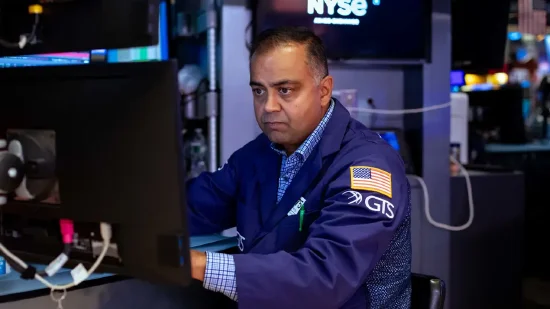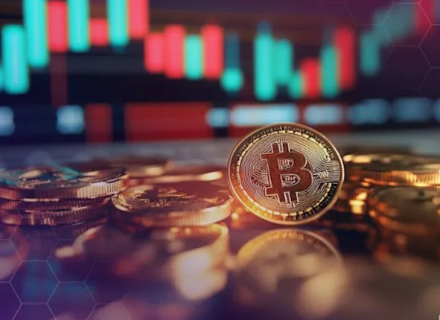Opening: U.S. stocks open lower on Tuesday as new tariff uncertainties hit the market
On the evening of September 2, Eastern Time, U.S. stocks opened lower on Tuesday. U.S. Treasuries were sold off, causing bond yields to soar. Investors are weighing the latest developments on the trade war front. The U.S. Court of Appeals ruled that most of Trump’s global tariffs are illegal, and the uncertainty triggered by this ruling put pressure on U.S. stocks.

The Dow Jones fell 413.31 points, or 0.91%, to 45,131.57 points; the Nasdaq dropped 384.66 points, or 1.79%, to 21,070.90 points; the S&P 500 index fell 77.33 points, or 1.20%, to 6,382.93 points.
In the just-concluded August, the U.S. market performed strongly. The Dow Jones rose more than 3% for the month, the S&P 500 climbed nearly 2%, and the technology-heavy Nasdaq index gained 1.6% for the month. This marks the fourth consecutive monthly gain for the S&P 500.
As U.S. stock trading enters September and the informal end of summer, investors are taking profits from bull market winners, with technology stocks such as Nvidia and Palantir generally declining on Tuesday morning.
Global Bond Market Faces Heavy Sell-off
Investors are also closely watching the surge in U.S. Treasury yields at the beginning of September. On Tuesday morning, the 10-year Treasury yield jumped to 4.29%, while the 30-year yield approached 4.98%.
In addition, global ultra-long-term (30-year) bond yields have generally soared, as investors worry about excessive debt levels from Japan to the United States. The global bond market experienced a broad correction, with long-term government bond yields in the UK and France rising to their highest levels in more than a decade on Tuesday, as investors grew increasingly concerned about the fiscal health of countries worldwide.
Continued concerns about the fiscal health of Europe and many countries globally have triggered sell-offs of long-term German and French government bonds. The yield on Germany’s 30-year government bond hit its highest level since 2011, while France’s 30-year yield reached a new high since 2009. Bond yields move inversely to prices.
French Prime Minister François Bayrou is expected to face a failed confidence vote next week, as opposition parties oppose his plans to cut government spending; meanwhile, UK Chancellor Rachel Reeves is expected to raise taxes in the autumn budget to meet fiscal targets.
The UK’s long-term government bond yields rose to their highest levels since 1998, as Prime Minister Keir Starmer faces difficulties in rebuilding market confidence. The pound fell more than 1%, hitting its weakest level against the euro in nearly a month.
U.S. Court of Appeals Rules Most of Trump’s Global Tariffs Illegal
The market is also watching the uncertainty surrounding Trump’s tariffs. Last Friday, the U.S. Federal Court of Appeals ruled that most of the global tariffs imposed by Trump were illegal and constituted an abuse of power. The Federal Circuit Court of Appeals voted 7 to 4, determining that only Congress has the authority to impose comprehensive tariffs.
The court stated that these so-called “reciprocal tariffs”—which targeted almost all of America’s trading partners—were illegally imposed. The ruling upheld a decision by the International Trade Court in May this year and rejected Trump’s previous claim that “imposing global tariffs under the International Emergency Economic Powers Act is legal.”
The appeals court did not immediately halt the tariffs but decided to maintain them until mid-October, meaning the U.S. government may further challenge the ruling in the Supreme Court.
Trump called the ruling “highly biased” and said he would appeal to the U.S. Supreme Court.
Aniket Shah, Head of Sustainability and Transformation Strategy at Jefferies Group, pointed out: “If the Supreme Court rules against Trump’s use of the International Emergency Economic Powers Act (IEEPA) to impose reciprocal tariffs, it will reduce the risk of a broad tariff war escalating, which is positive for the market. However, short-term uncertainty may rise, and some trade agreements may face renegotiation.”
These developments may affect market sentiment in September. Historically, September is the worst-performing month for U.S. stocks. In the past five years, the S&P 500 has averaged a 4.2% decline in September, with an average drop of more than 2% over the past decade.
Federal Reserve Independence Under Scrutiny
Given the Trump administration’s attempts to remove central bank officials, the future of the Federal Reserve’s independence has also become more uncertain.
The hearing on the temporary restraining order prohibiting Trump from removing Lisa Cook concluded last Friday without a ruling. Stephen Miran, a Federal Reserve governor nominated by Trump, will attend a Senate Banking Committee hearing on September 4.
The Federal Reserve will hold its monetary policy meeting in mid-September.
Swap markets currently show a 90% probability of a 25 basis point Fed rate cut this month, with three more similar cuts expected by June next year.
UBS expects that, as inflation remains near target and labor market risks rise, the Fed will cut rates at four consecutive meetings starting in September, with a cumulative cut of 100 basis points.
The bank noted that July’s moderate Personal Consumption Expenditures (PCE) data, weakening job demand, and increasingly dovish statements from Fed officials all indicate that the Federal Open Market Committee (FOMC) is ready to take action on rate cuts.
Economic Data: Focus on August Nonfarm Payroll Report This Week
This week, traders will focus on Friday’s August employment report and its impact on the Fed’s mid-month rate decision. Before that, job openings and private sector employment data will provide investors and the Fed with a clearer picture of the labor market, which is at the core of policy discussions.
Tuesday will first see the U.S. Institute for Supply Management (ISM) August manufacturing and services surveys. Friday’s nonfarm payroll report is expected to show employment growth below 100,000 for the fourth consecutive month, marking the weakest period since the COVID-19 outbreak in 2020.
Andrea Tueni, Head of Sales Trading at Saxo Bank France, said: “As we approach key U.S. inflation and labor market data, there is a lot of caution in the market. This requires a certain degree of prudence in future operations.”
Focus Stocks
PepsiCo shares rose, reportedly as the world’s largest activist fund—Elliott hedge fund—plans to take action to boost the stock price.
Novo Nordisk shares edged higher. Previous reports indicated that the company’s Wegovy showed significant cardiovascular protective effects in trial subjects, far surpassing Eli Lilly’s competing products Mounjaro and Zepbound.
NIO set new records for both delivery and revenue guidance in the third quarter.
KE Holdings received multiple reiterations of “buy” ratings from institutions after its earnings report.
BeiGene’s tisotumab vedotin was approved in Hong Kong for the treatment of recurrent or metastatic cervical cancer.
Hesai recently passed the hearing at the Hong Kong Stock Exchange.
Harmony Gold, Cordelion Mining, New Gold, DRDGOLD, Kinross Gold and other gold stocks generally rose.
Disclaimer: The content of this article solely reflects the author's opinion and does not represent the platform in any capacity. This article is not intended to serve as a reference for making investment decisions.
You may also like
Bitcoin price dips below 88K as analysis blames FOMC nerves

Crypto: How Europe Wants to Enforce Its Version of the SEC

Stablecoin : Western Union plans to launch anti-inflation "stable cards"

Mars Morning News | SEC Expected to Issue "Innovation Exemptions" for the Crypto Industry in "About a Month"
The SEC is expected to issue an innovation exemption for the crypto industry. The UK "Digital Assets and Other Property Act" has come into effect. BlackRock's CEO revealed that sovereign wealth funds are buying bitcoin. Bank of America recommends clients allocate to crypto assets. Bitcoin selling pressure is nearing its end. Summary generated by Mars AI. The accuracy and completeness of this summary are still being improved as the Mars AI model continues to iterate.

